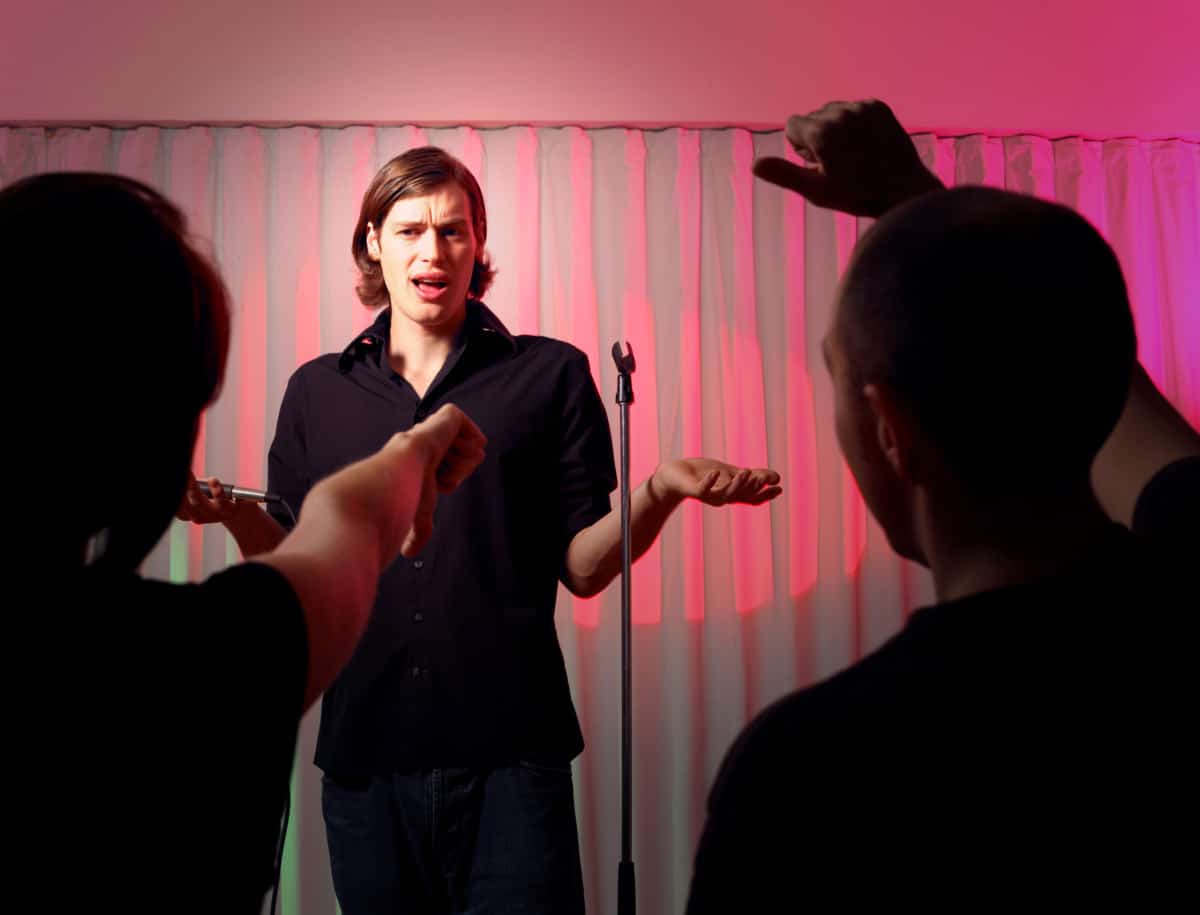Comedy outside a comedy club is an art form all to itself. Some people thrive some people looks as though they’ve aged a year for every minute they’ve been on stage. It’s never the ideal situation.
Performing outside a comedy club is knowing what audience you are performing for, what material is suitable for such an audience, and learning to read the room,be in the moment and handle whatever the show throws at you for that small amount of time you are on stage.
The best way to prepare for shows outside comedy clubs is to actually go out and find shows outside comedy clubs. Open mics in coffee shops, bars, or even backyards are great ways to hone your skills outside a comedy club. These venues will probably still be expecting comedy so adding a non comedy open mic to your list of places to perform will help you deal with crowds not expecting comedy.
Imagine this situation: As you take the microphone you’re greeted with a standing ovation, but that’s only because there are no chairs. Now, comedy audiences are notoriously impatient, you need to make them laugh fast and often or else things can get real awkward real fast. Take away their chairs? That impatience goes up exponentially. Also, at a comedy club most people are there to see comedy. At a birthday party, most people are there to get some free food/booze, brag about their job and leave before Aunt Carla starts getting too handsy. When you do comedy at birthday parties, you have to convince people to even pay attention to your set, let alone laugh. The hardest part of any comedy show is if the audience contains kids.
Let me say, there are many shows with children present and under the right circumstances it’s totally fine, but when a large portion of the crowd is rowdy, drunk adults it can make for a difficult combination. And although all your material is clean by adult standards, there are elements of certain bits that are uncomfortable to deliver when you’re looking down at a group of kindergartners. So you launch into an old joke that you know well enough that you can go on autopilot as you tell it and mentally edit out of your set any planned bits that are awkward for kids.
What do you do in that situation? Do you ignore it and just power through your set? Do you try to interact with the children? These are the kind of questions you need to answer on the fly when performing outside of a classic comedy venue. You have to learn to be able to thread that needle, put on a good show and collect your money.
So, why do it? Well, for one thing, there are only so many comedy clubs and there are SO many comedians that it’s vital to do alternative venues as a means for stage-time and revenue. In just a few years of doing stand up, you can perform in just about every type of venue you can imagine. Living rooms, lunch rooms, classrooms, retirement communities, if they’ll pay the fee, do it (with some exceptions). Those private or corporate gigs often pay more per show than comedy club gigs and sometimes the audiences can be amazing and sometimes they can be horrific. Then there are the showcases in Los Angeles that are run by other comedians that you do just to try out new material and often those pay very little or nothing, but are worth it for the stage-time.
The biggest key to performing at non-traditional comedy venues is to be flexible with your material and stay in the room (meaning, don’t get lost in your material and ignore the weird things going on around you). You have to also assess what kind of audience it is. At a comedy club, you don’t have to really mold your material for a specific audience because often anything goes there. At a corporate gig in a tech company’s lunchroom, you likely will have to shift things around. I also recommend not getting too locked into any one type of venue, especially when you’re starting out. A lot of comedians pretty much only perform at showcases/open mics in bars or similar venues with similar audiences and when they try to branch out and do a country club gig or something out of their comfort zone, they struggle.
In the end, as with pretty much anything in life, you learn through trial and error. The more you perform at a variety of venues, the more you’ll experience the various pitfalls and traps of each one, and if you’re smart, you’ll learn from them and be better equipped to handle them in the future. There are very few perfect venues, even among comedy clubs, so it’s definitely something you must develop. However, there are certain venues where the setup is so awful that it’s nearly impossible to overcome.
For example, a bar gig where there were 60 people talking and watching their home team’s playoff game within a few feet of the 4 people who were there for the comedy show. The chatter was so loud, you could barely hear the comedians through the speakers and there was no way the comedians were winning that battle. But in general, being able to succeed in a variety of venues is a major key to developing a successful comedy career, it opens up many more sources of revenue from private/corporate gigs and makes you appreciate how good you have it when you perform at one of the truly great comedy clubs.
If you take time to work outside the comfort of traditional comedy clubs you can find other places to get fans as well as ways to make money that do not rely on a club putting you on stage, which often results in them making money and leaving you only a free drink or meal if you are lucky. Some of the best paying gigs are outside comedy clubs as you can leverage your talent and time for money. Get on other stages now and reap the rewards later.

